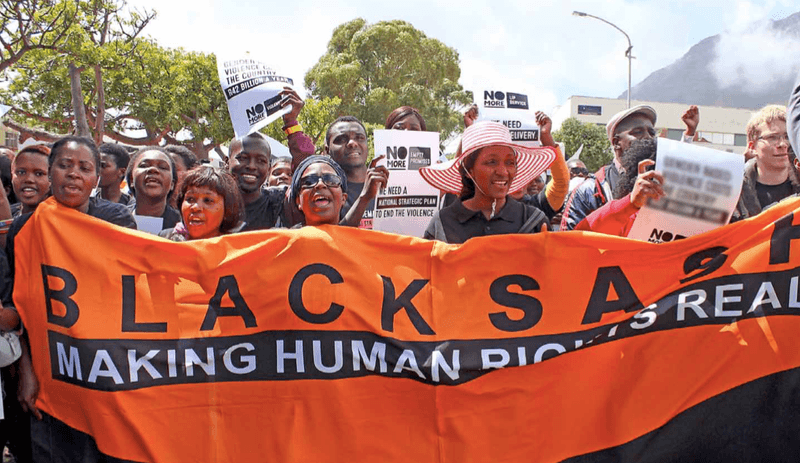
The Black Sash is a non-profit organisation in South Africa that works to eliminate poverty and inequality — with a focus on women and children — through advocacy, community-based monitoring, education, training, and research.
One of The Black Sash’s program areas is to ensure that South Africans have access to social security. According to the United Nations, social security helps to mitigate poverty and vulnerability,I deleted the rest of the sentence because we do not have a comprehensive socials security system as yet.The South African social security system is one of the largest social security systems in the world:Approximately one-third of the South African population receives social assistance as one form of social security which is called social grants. Social grants are a fundamental lifeline for people to afford basic needsI deleted the rest of the sentence because it implies that it is enough to afford what was listed which it is not.they are a poverty alleviation strategy by the South African government. Disruptions to people receiving their social grants pose a threat to their survival.
The Black Sash’s interest in participating in the Progressive International and the Debt Justice Working Group is driven by our work to ensure that the State fulfills their obligations to provide basic income support via social grants that must be protected from predatory lenders which put social grant recipients in debt traps.. In recent years, social grants have been subject to unlawful deductions, with service providers from the private sector contracted by the South African government to administer social grants; which provided the opportunity to engage in predatory financial practices, including reckless lending that resulted in indebtedness of social grant recipients. By contracting with a private entity to distribute social grants, the government of South Africa has taken social grant money out of the pockets of the poor to enrich a Wall Street firm.
Privatization and Profits in South Africa
The right of social grant beneficiaries to receive their grants in full came under threat when a private entity was contracted to administer the payment of social grants. In 2012, the state contracted a single service provider to distribute social grants nationally. Cash Paymaster Services (CPS) was contracted for R10 billion over five years to annually distribute on average R160 billion to over 17 million beneficiaries. CPS is a subsidiary of Net1, a company listed on the Johannesburg and New York stock exchanges. According to the government of South Africa, they appointed CPS and Net1 for their biometric and digital capability.
CPS and parent company Net1 said they were going to “banking the unbanked” as a means of financial inclusion.However, there was a profit incentive through market expansion with a specific business model. They followed a two-pronged approach. In the first wave, they identified specific territories in which they would build up their technological infrastructure and register a critical mass of cardholders/customers. Once their infrastructure was in place and they had enrolled a critical mass of customers, Net1 would tempt consumers with a wide array of financial products and services for which fees are charged based on the value of the transactions performed.
What’s more, through evidence collected by the Black Sash and its community partners, we learned that Net1 allowed its subsidiaries and others in its network to sell financial and other products to social grant recipients, accruing large profits in addition to their contract rate with the South African government. Net1 shared the social grant beneficiaries’ confidential biometric data collected during registration.
The profit motive of Net1 superseded any obligations to the people of South Africa, or its responsibilities under its contract with the South African government. The company supported unlawful and fraudulent deductions from some of the poorest people in South Africa, thereby threatening people’s right to social security including social assistance. Because of Net1’s exploitative financial practice, people lost some or all of their social grants. These practices are particularly insidious because deductions or debits were made electronically from a beneficiary’s account before the beneficiary was even able to access the account. These practices also occurred with no risk to the creditor (whether the deduction was authorised by the claimant or not) since the money was automatically transferred out of the account the moment a beneficiary’s grant entered their account.
An Internationalist Call to Action
The Progressive International provides a platform to engage with other nations, and to share the South African experience of what happens when a private company listed on the New York Stock Exchange is allowed to profit from the fulfillment of a state obligation. This case will be significant to consider because Net 1 and similar companies operate internationally, and have plans to expand their business models which by making a profit off vulnerable people.
We look forward to active participation and robust engagement to work towards developing international standards to ensure the protection of the most vulnerable against abusive lending practices.





